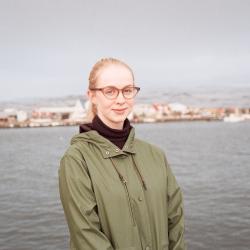Along with the ever-lighter nights and the occasional excitement of double-digit temperatures, the Reykjavík Arts Festival is a welcome harbinger that summer is here. Now in its 30th year, the festival gives the people of Reykjavík an opportunity to celebrate the change of seasons by staging a variety of big outdoor events and a rich mixture of art, dance, music, theatre, openings and parties.
The director of the festival is Hanna Styrmisdóttir, who decided that the 2015 theme—human rights and celebrating women in art—was too big a subject for just one year’s programme. With that in mind, the 2016 edition—‘SÍÐARI HLUTI’ (“Second Part”)—will continue to explore these areas.
“Last year we celebrated the 100th anniversary of women’s suffrage in Iceland,” says Hanna. “But I didn’t want the theme to be a one-off, so we decided to spread it over two festivals, and continue the theme.”
Body of work
Hanna’s aim this year was to expand the range of work on offer and go deeper into each area. “Artists reflect their times,” she explains. “We wanted to broaden our horizon and look specifically at narratives of artists regardless of gender, which engage with and reflect aspects of social struggles. Our ideas of freedom and equality, of human rights, are centred on the body and the body is at the centre of this year’s programme.”
The approach taken this year was different, too. “In 2015 we commissioned artworks by female artists, focused on women’s matters,” says Hanna. “This year, however, we instead looked at the artists’ backgrounds and their stories. We picked FlexN, a street dance group composed of men and women; ‘Lucrezia’ by Handel, performed by Symphonia Angelica; and other performances that focus on different aspects of women’s reality—which sadly isn’t always positive.”
Crucial connections
With a year having passed since the festival started its tenacious investigation into the institutional problems faced by women artists and marginalised groups, we asked Hanna: Has anything improved in the last year?
“It depends on your viewpoint,” she says. “In some places, the world has never been as open, tolerant, equal and free. In other parts, we have gone back many centuries; rights that have been gained have been lost in tragic ways. Our world has always been complex but now that we know more of it, it’s become more complex still.”
“For me, a festival like the Reykjavík Arts Festival is essentially about opening up this complex world, so that we can become more understanding of and engaged in what is happening globally,” she finishes. “If we love a performance of Indian Kuchipudi, then we may also become more engaged and interested in Indian history and contemporary culture and life in general. And that connection has never been more crucial.”
Care more
Drawing connections between widely varying cultural practises is a big part of Hanna’s job at the festival. She speaks with pride about the range on offer at the imminent new edition, from the San Francisco Ballet and Iceland Symphony Orchestra performing works by Helgi Tómasson, to dance performances by FlexN and Sidi Larbi Cherkaoui & Shantala Shivalingappa.
But given its popularity, it surprised many that the 2016 edition will be the festival’s final annual edition, with the next event scheduled for 2018. Even as Reykjavík’s cultural scene is blossoming, Hanna explains that after four years at the helm of the festival, her philosophy is that less can be more.
“I think we should do less, but with more care,” she explains. “The explosion of culture in Reykjavík over the last few years is a fantastic thing—it has transformed everyday life in this city. But it also calls for a more strategic approach to what we are doing in the arts in general. There is a need for a larger, bolder, more powerful multi-disciplinary platform than the Reykjavík Arts Festival can be as an annual event.”
So, it’ll be two years before this most precious event on Reykjavík’s cultural calendar returns, bigger and better than ever—all the more reason to enjoy this one while it lasts.
The 2016 Reykjavík Arts Festival is held between May 21st and June 5th. Check out the programme at http://en.listahatid.is. and see our special pull out in the curent issue.
Buy subscriptions, t-shirts and more from our shop right here!
















